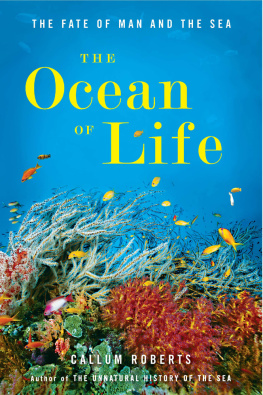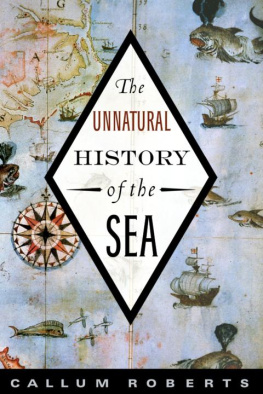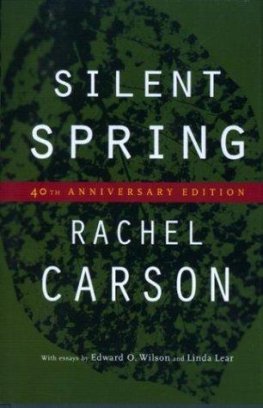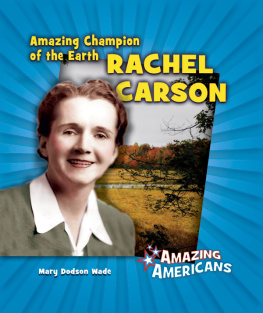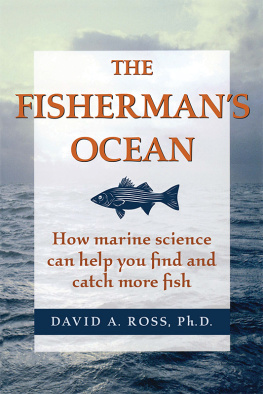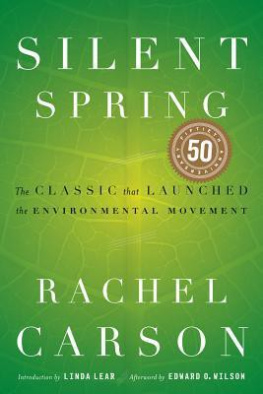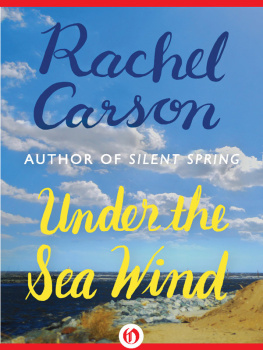The Ocean
of Life
THE FATE OF MAN
AND THE SEA
Callum Roberts
VIKING
VIKING
Published by the Penguin Group
Penguin Group (USA) Inc., 375 Hudson Street, New York, New York 10014, U.S.A.
Penguin Group (Canada), 90 Eglinton Avenue East, Suite 700, Toronto, Ontario, Canada M4P 2Y3
(a division of Pearson Penguin Canada Inc.)
Penguin Books Ltd, 80 Strand, London WC2R 0RL, England
Penguin Ireland, 25 St. Stephens Green, Dublin 2, Ireland (a division of Penguin Books Ltd)
Penguin Books Australia Ltd, 250 Camberwell Road, Camberwell, Victoria 3124, Australia
(a division of Pearson Australia Group Pty Ltd)
Penguin Books India Pvt Ltd, 11 Community Centre, Panchsheel Park, New Delhi - 110 017, India
Penguin Group (NZ), 67 Apollo Drive, Rosedale, Auckland 0632, New Zealand
(a division of Pearson New Zealand Ltd)
Penguin Books (South Africa) (Pty) Ltd, 24 Sturdee Avenue, Rosebank,
Johannesburg 2196, South Africa
Penguin Books Ltd, Registered Offices: 80 Strand, London WC2R 0RL, England
First published in 2012 by Viking Penguin, a member of Penguin Group (USA) Inc.
1 3 5 7 9 10 8 6 4 2
Copyright Callum Roberts, 2012
All rights reserved
constitutes an extension of this copyright page.
LIBRARY OF CONGRESS CATALOGING IN PUBLICATION DATA
Roberts, Callum.
The ocean of life / The Fate of Man and the Sea / Callum Roberts.
p. cm.
Includes bibliographical references and index.
ISBN: 978-1-101-58356-2
1. Ocean and civilization. 2. OceanHistory. I. Title.
CB465.R62 2012
551.46dc23 2012000252
Printed in the United States of America
No part of this book may be reproduced, scanned, or distributed in any printed or electronic form without permission. Please do not participate in or encourage piracy of copyrighted materials in violation of the authors rights. Purchase only authorized editions.
ALWAYS LEARNING
PEARSON
To my daughters, who love the sea
Roll on, thou deep and dark blue Ocean, roll!
Ten thousand fleets sweep over thee in vain;
Man marks the earth with ruin, his control
Stops with the shore
Lord Byron, Childe Harolds Pilgrimage
Prologue
T he water felt chilly as I waded out to fetch the battered skiff from its mooring. It slid easily over the glassy lagoon to the beach, where Julie waited with our diving gear. We had been married a month, and in lieu of a honeymoon I had persuaded her to accept two months of fieldwork studying fish behavior on this remote patch of Australias Great Barrier Reef. It was June 1987, winter in Australia and summer back home. Two herons picked their way along the shoreline looking for breakfast. They flapped off as the outboard engine coughed to life, and we set course for a spot a mile away, across a maze of coral so complex that it would have baffled the most capable navigator.
We anchored on a rubble ridge that separated the lagoon from the open sea. This was our first ocean dive here, and the thrill of expectation was tempered by a frisson of fear. Ahead of us the homely greens and browns of the shallow reef gave way to the dark indigo of the deep. Huge buttresses of coral plunged down hundreds of feet in parallel walls separated by deep channels. Vivid purple finger-corals vied for space with yellow lettuce-coral, while great mounds of blue and green polyps rose from the bottom.
The reef was a confusing swirl of movement, like Grand Central Station at rush hour. Stocky surgeonfish with electric blue stripes raced around purposefully while loose groups of gaudy parrotfish dodged them. Clouds of damselfish and anthias hovered above, delicately plucking invisible food from the water. Along the edge of the reef I counted eight loggerhead turtles, one for each buttress in view. A gray reef shark headed our way but barely acknowledged us as he passed by. The whole scene felt timeless and primordial. I was transfixed.
I wonder what I would have thought if on return to shore we had been greeted by a curmudgeonly sage who prophesied that in one hundred years this magnificent reef would be a crumbling ruin, that its bright coral escarpments would be replaced by green fuzz, and that the ranks of fish would have thinned and given way to swarms of jellyfish and gelatinous plankton. I would probably have thought him mad. Nothing could have seemed less likely. And yet less than twenty-five years later most serious marine scientists predict just such a fate. We can already see it happening.
Eleven years after our honeymoon dive, in a foretaste of a warmer world to come, the oceans heated so dramatically that a quarter of the worlds coral died. In much of the Indian Ocean 70 percent to more than 90 percent of all corals died, taking with them countless creatures who used coral for living space or food. If three quarters of our forests had withered and died that year, people would have demanded to know why, and aggressive plans would have been drawn up for their recovery. Yet this global catastrophe passed largely unseen and unremarked outside the world of marine science.
The worlds oceans have been very stable for most of civilized history. Since the seas leveled off six or seven thousand years ago, after the last ice age, they have for the most part been predictable. Yes, coasts have retreated and advanced under the relentless influence of wave and tide, but the oceans themselves seemed changeless. Their constancy contrasted with the world above water, where landscapes underwent dramatic alterations as first pastoralists and agriculture spread, and then later cities and industry. Today it is the turn of the oceans.
This is a book about the sea change unfolding around our planet. In the last half century human dominion over nature has finally reached the oceans. The speed and extent of these changes has caught us unprepared. The sea is becoming more hostile to life, and not just for the creatures that swim, scuttle, or crawl beneath the waves, but for us too. Only in the last decade or so have we begun to recognize how our activities are reshaping the oceans, and what that means for our own well-being.
We have long known how humankind has changed the land, modifying landscapes to suit our needs and affecting its wildlife across thousands of years. Tens of thousands of years, if you consider how Australian aboriginals and Native Americans used fire to clear vegetation and facilitate hunting and gathering. But we persist in believing, as to paraphrase Byron in the epigraph to this book, that humanitys dominion stops at the sea. Yet even in Byrons time human impacts on the sea were significant. The great auk stood two decades from extinction and the Atlantic gray whale had vanished forever. Fishing had begun to deplete stocks close to coasts and damage habitats with trawls and dredges. People were throwing up coastal defenses, and large areas of marsh and estuary had been reclaimed for ports and agriculture. Rivers in populous regions filled coastal estuaries and bays with mud washed from land exposed by the plow.
Our influence has grown exponentially since then. The last two hundred years have seen marine habitats wiped out or transformed beyond recognition. And with an ever accelerating tide of human impact, the oceans have changed more in the last thirty years than in all of human history before. In most places the oceans have lost upward of 75 percent of their megafaunalarge animals such as whales, dolphins, sharks, rays, and turtlesas fishing and hunting spread in waves across the face of the planet. For some species, numbers are down as much as 99 percent as is the case for oceanic whitetip sharks of the high seas, American sawfishes, and the common skate of Northern Europe. By the end of the twentieth century, almost nowhere shallower than three thousand feet remained untouched by commercial fishing and some places are now fished to ten thousand feet down.

